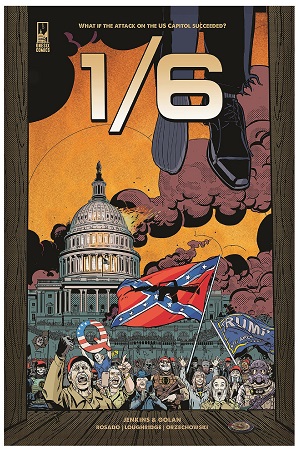
Picture an alternative to what occurred on 6 January 2021.
Follow a character, Sage, as she makes her way through an alternate Washington, D.C., now dominated by a Trump-induced dictatorship where Proud Boys and Oathkeepers roam the streets, far-right MAGA Republicans have public institutions named in their honor, and a sort of neo-confederate, neo-fascist, paleo-conservative fundamentalism mixed with white Christian nationalism reigns.
Cue the image of Abraham Lincoln’s statue, at the Lincoln Memorial, with a confederate flag covering the sacred words of freedom behind President Lincoln’s frame. Drones fly through the air, with Neo-Nazi memorabilia and symbolism, and tanks line the streets hunting for leftwing activists and those branded with membership to ANTIFA. Welcome to America. Check your old-school virtues of Life, Liberty, and Pursuit of Happiness at the door. In the world of the comic strip 1/6’s first issue – What if the Attack on the U.S. Capitol Succeeded? – Harvard Law School Professor Alan Jenkins, bestselling graphic novelist Gan Golan, and legendary comic illustrator William Rosado bring to vivid life a world we’ll see soon enough…without hard work, a fight, and effort.
“There are still 179 election deniers in Congress who were either elected or reelected in the 2022 midterms,” Professor Jenkins states, in an interview with the political fan site Comics DC. “The forces of anti-Semitism and racism and xenophobia that fueled the insurrection, the actual riot, are still very much with us. I’m very worried, which is one of the main reasons why we wrote the series.” Jenkins has the kind of social activism prevalent in his creative work matching someone on a level of Ava DuVernay, or Jordan Peele.
But particularly with respect to the latter, Jenkins shies away from out-and-out escapism and more implicit messaging. If you can’t tell it like it is, the graphic novel’s frankness seems to say, why tell it at all? The real-world implications of a landscape matching what’s in the pages of 1/6: The Graphic Novel Issue #1: What if the Attack on the U.S. Capitol Succeeded? could be cataclysmic to minorities, minority religious groups, and anyone deemed not onboard with this new form of American patriotism.
Note the word ‘patriot’ and ‘patriotism’ in the rhetoric affiliated with the MAGA movement. Whatever happened to American Exceptionalism? Perhaps, in this new world originating with the infamous 2016 electoral speech by forty-fifth US President Donald Trump, such a dystopia proves to be the movement’s solution to restoring their definition of ‘Greatness’ in the American Experiment.
AMAZON: www.amazon.com/Graphic-Novel-Attack-Capitol-Succeeded-ebook/dp/B0BR4BVFGX
“…I do have a lot of hope,” Jenkins says, in the aforementioned interview. “I think that we have in our country a history and a legacy of standing up to bigotry, of standing up to authoritarianism and defending democracy…The story’s unwritten, literally and figuratively. And I’m betting on democracy…We really believe it’s important to treat everyone with empathy, to try to understand people’s motivations, rather than demonize them…Hopefully we told the story. We are telling a story that can be appealing to everybody.”
Clay Burton
